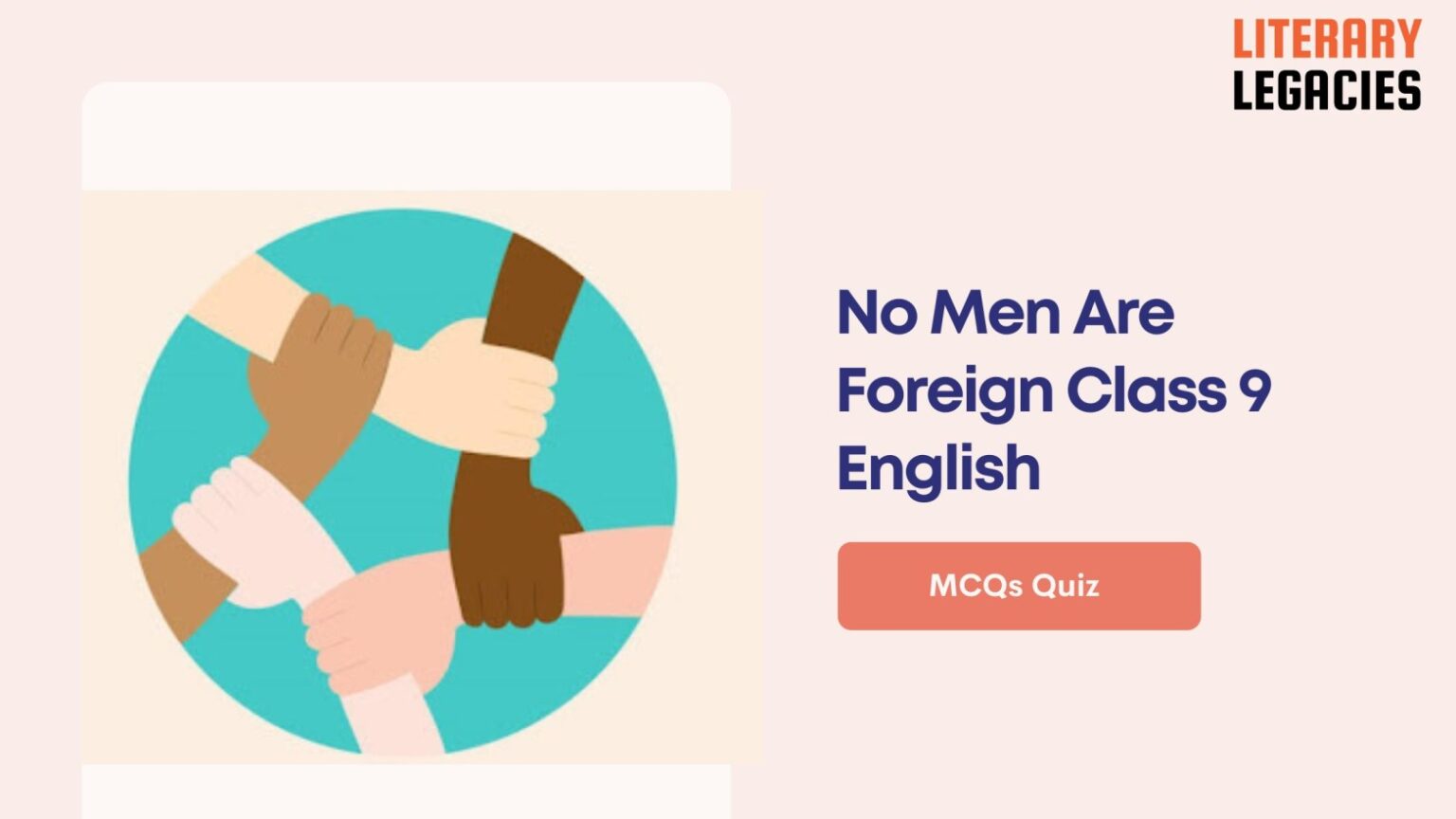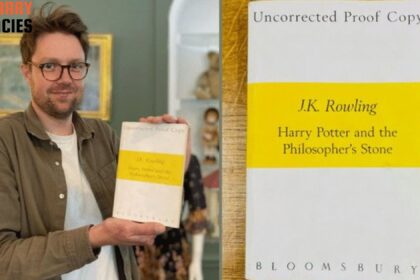1. What is the main theme of the poem ‘No Men are Foreign’?
A. The role of God in creating inequality among humans
B. The importance of national borders
C. The unity and equality of all human beings
D. The differences between soldiers from various countries
Answer: The unity and equality of all human beings (C)
The poem emphasizes the idea that all humans are equal and belong to one human race, regardless of their nationality or geographical location.
2. What does the poet mean by ‘no men are strange and no country is foreign’?
A. That all countries are equal in terms of economic power
B. That some countries are more superior than others
C. That all humans are different from one another
D. That national borders should be removed to unite all humans
Answer: That national borders should be removed to unite all humans (D)
The poet wants to remove all national borders, implying that all humans belong to one human race and should be free to move around without restrictions.
3. What do humans need to survive, according to the poem?
A. Wealth, fame, and recognition
B. Nationality, religion, and identity
C. Sun, air, water, and clothes
D. Money, power, and status
Answer: Sun, air, water, and clothes (C)
The poem highlights the basic necessities of human life, which are common to all, regardless of their nationality or geographical location.
4. What happens to humans after death, according to the poem?
A. They are buried in the same earth
B. They are sent to a different planet
C. They are reincarnated into different forms
D. They are judged by God
Answer: They are buried in the same earth (A)
The poem states that upon death, humans are buried in the same earth, emphasizing the shared humanity and equality of all.
5. What is the result of human actions, according to the poem?
A. Peace and harmony among nations
B. Unity and cooperation among countries
C. Economic growth and development
D. Hatred, fighting, and environmental pollution
Answer: Hatred, fighting, and environmental pollution (D)
The poem highlights the negative consequences of human actions, such as hatred, fighting, and environmental pollution, which affect all humans equally.
6. What is the poet’s attitude towards war?
A. War is a way to demonstrate power and strength
B. War is a means to resolve conflicts
C. War is necessary for national security
D. War leads to suffering and starvation
Answer: War leads to suffering and starvation (D)
The poet portrays war as a negative phenomenon that leads to suffering and starvation, affecting all humans equally.
7. What is the poet’s message about nature?
A. Nature is beautiful and bountiful
B. Nature is harsh and unforgiving
C. Nature is a source of conflict and strife
D. Nature treats all humans equally
Answer: Nature treats all humans equally (D)
The poem suggests that nature provides equally to all humans, regardless of their nationality or geographical location.
8. What is the tone of the poem ‘No Men are Foreign’?
A. Pessimistic and negative
B. Critical and reflective
C. Angry and aggressive
D. Optimistic and hopeful
Answer: Critical and reflective (B)
The poem has a reflective and critical tone, encouraging the reader to think about the consequences of human actions and the importance of unity and equality.
9. What does the poem suggest about the role of God?
A. God is responsible for creating inequality among humans
B. God treats all humans equally
C. God is a symbol of national identity
D. God does not exist
Answer: God treats all humans equally (B)
The poem suggests that God treats all humans equally, providing them with the same basic necessities and resources.
10. What is the overall message of the poem ‘No Men are Foreign’?
A. Environmental pollution is a natural phenomenon
B. All humans are equal and belong to one human race
C. War is a necessary evil
D. Nationality is the most important aspect of human identity
Answer: All humans are equal and belong to one human race (B)
The poem’s overall message is that all humans are equal and belong to one human race, regardless of their nationality or geographical location.
11. What is the central theme of the poem?
A. The superiority of one’s own country
B. The similarities between people of different countries
C. The differences between various cultures
D. The importance of war in resolving conflicts
Answer: The similarities between people of different countries (B)
The poet highlights the similarities between people of different countries to promote unity and understanding.
12. According to the poet, what has God given to people of other countries?
A. Superior strength and intelligence
B. Similar eyes and strength that can be won through love
C. Different eyes and strength
D. Inferior abilities and traits
Answer: Similar eyes and strength that can be won through love (B)
The poet emphasizes that God has given people of other countries similar physical characteristics and abilities as us.
13. What happens when we pick a weapon against someone according to the poet?
A. We promote peace and understanding
B. We show our bravery and strength
C. We defile the earth with their blood
D. We protect our country and people
Answer: We defile the earth with their blood (C)
The poet highlights the negative consequences of war and violence.
14. What is the result of war according to the poet?
A. Losses and destruction for both parties
B. The resolution of conflicts
C. Victory and triumph for one side
D. The emergence of a hero
Answer: Losses and destruction for both parties (A)
The poet emphasizes that war leads to destruction and losses for all involved parties.
15. What does the poet ask the reader to remember?
A. That God has given our enemies different eyes and strength
B. That no men are foreign and no countries are strange
C. That our enemies are different from us
D. That war is necessary for resolving conflicts
Answer: That no men are foreign and no countries are strange (B)
The poet concludes the poem by reiterating the theme of unity and shared humanity.
16. Why does the poet say that we should stay away from negativity?
A. Because it deprives, condemns, and cheats ourselves
B. Because it harms our enemies
C. Because it is a sin
D. Because it promotes war and violence
Answer: Because it deprives, condemns, and cheats ourselves (A)
The poet emphasizes that harboring negative feelings towards others ultimately harms ourselves.
17. What is the poet’s attitude towards war?
A. It is necessary for resolving conflicts
B. It is a game for heroes
C. It is destructive and pollutes the earth and air
D. It is a means of showing bravery and strength
Answer: It is destructive and pollutes the earth and air (C)
The poet has a negative view of war, highlighting its destructive consequences.
18. What is the poet’s message about people of other countries?
A. They are similar to us in many ways
B. They are a threat to our existence
C. They are inferior to us
D. They are unimportant
Answer: They are similar to us in many ways (A)
The poet emphasizes that people of other countries are similar to us, promoting unity and understanding.
19. What does the poet compare the dead bodies of war to?
A. Heroes of the past
B. Symbols of bravery
C. Impurities that pollute the earth
D. Martyrs for a cause
Answer: Impurities that pollute the earth (C)
The poet highlights the negative consequences of war, comparing the dead bodies to impurities that pollute the earth.
20. What is the poet’s main objective in the poem?
A. To promote hatred towards other countries
B. To encourage war and violence
C. To highlight the similarities between people of different countries
D. To emphasize the importance of national borders
Answer: To highlight the similarities between people of different countries (C)
The poet’s main objective is to promote unity and understanding by highlighting the similarities between people of different countries.



